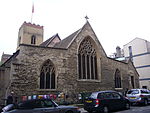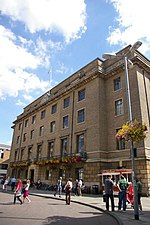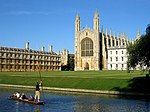St Edward King and Martyr, Cambridge
Church of England church buildings in CambridgeGrade II* listed buildings in CambridgeGrade II* listed churches in CambridgeshireHistory of CambridgeRoyal Peculiars ... and 1 more
Use British English from February 2023

St Edward King and Martyr is a church located on Peas Hill in central Cambridge, England. It is dedicated to Edward the Martyr, who was King of England from 975 until his murder in 978. In 1525 it was at St Edward's that what is said to have been perhaps the first "openly evangelical" sermon of the English Reformation was delivered, and the church is sometimes labelled the "Cradle of the Reformation".It has been considered a royal peculiar, not belonging to a diocese, but this is disputed.
Excerpt from the Wikipedia article St Edward King and Martyr, Cambridge (License: CC BY-SA 3.0, Authors, Images).St Edward King and Martyr, Cambridge
Peas Hill, Cambridge Newnham
Geographical coordinates (GPS) Address External links Nearby Places Show on map
Geographical coordinates (GPS)
| Latitude | Longitude |
|---|---|
| N 52.20465 ° | E 0.1186 ° |
Address
St Edward King and Martyr
Peas Hill
CB2 3PP Cambridge, Newnham
England, United Kingdom
Open on Google Maps










